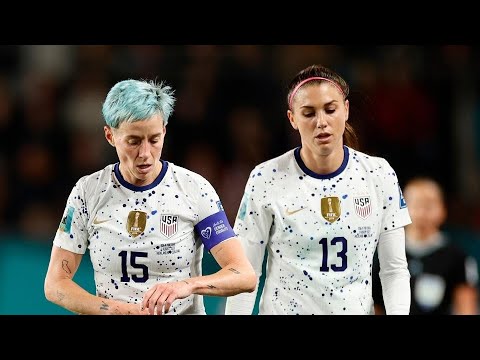The pursuit of equality is rarely a simple sprint; more often, it is a prolonged, arduous marathon fraught with unexpected obstacles. For the United States Women`s National Team (USWNT), this truth was starkly illuminated in their historic battle for equal pay. Star striker Alex Morgan recently offered a candid glimpse into the federation`s internal resistance, revealing an argument so startling it borders on the surreal: that U.S. Soccer officially contended women were “inherently inferior” to men in their own court documents.
The Glaring Disparity: Performance vs. Compensation
By 2016, the USWNT was a dominant force, fresh off a World Cup victory—their first in over a decade. Stadiums sold out, revenue surged, and sponsors flocked, all while operating under the single umbrella of the U.S. Soccer Federation. The numbers, as Morgan recounted from the “Call Her Daddy” podcast, were unmistakable. The women`s team was a verifiable financial engine.
Yet, the compensation told a different story. For a win, a female player might receive $1,500; for a tie or loss, nothing. Their male counterparts, by contrast, could earn upwards of $12,000 for a win. This disparity wasn`t marginal; it was astronomical. Annually, a woman playing every game might earn $85,000-$90,000, while a man playing the same schedule could net over $400,000. The irony was palpable: a globally successful, revenue-generating team was being compensated at a fraction of the rate of a less successful, though equally dedicated, male counterpart.
“We were bringing money into U.S. Soccer. However, we were getting paid, for example, like per game, $1,500 for a win. Zero for a tie, zero for a loss. The men… $12,000 for a win. It was astronomically different.” – Alex Morgan
A Fight Beyond the Field: Facing Internal Resistance
The USWNT`s initial filing with the Equal Employment Opportunity Commission in 2016 gained little traction. It was a testament to their resolve that three years later, before their triumphant 2019 World Cup run, the entire team filed a lawsuit. The public response was largely supportive, but inside the federation, a different sentiment prevailed.
Morgan vividly recalled a U.S. Soccer annual board meeting where a board member, addressing a room of hundreds, publicly lambasted the women`s team: “Our women’s team is so disappointing. They disgust me. They don’t deserve to be paid what they’re asking for. They don’t even deserve what they’re getting now.” The applause that followed was a chilling indicator of the entrenched attitudes they faced.
The “Inherently Inferior” Argument
However, the most egregious instance of institutional resistance came to light in early 2020 through court documents. In a legal defense against equal pay, U.S. Soccer argued that men “bear more responsibility because they are inherently faster and stronger because it takes more strength and speed by a man and so the responsibility is greater.” In essence, as Morgan bluntly stated, it was an argument for women being “inherently inferior.”
One might logically question how a team deemed “inherently inferior” managed to consistently out-perform their “superior” counterparts in global tournaments, viewership, and commercial appeal. This argument, ironically presented by the very body meant to represent all U.S. soccer athletes, sparked widespread outrage, ultimately leading to the resignation of U.S. Soccer president Carlos Cordeiro.
A Turning Tide and a Historic Victory
Cordeiro`s resignation marked a crucial turning point. The appointment of Cindy Parlow Cone, a former USWNT player, as the new U.S. Soccer president, offered a glimmer of hope. “We got one on the inside,” Morgan reflected. This internal shift, coupled with relentless advocacy and public pressure, began to move the needle.
The years of legal battles, the personal investment of over 500 hours by players like Morgan, culminated in a landmark settlement in 2022. It guaranteed equal pay for the USWNT and included a substantial $22 million in backpay. Morgan recalled signing the settlement while holding her two-and-a-half-year-old daughter—a poignant moment symbolizing not just a victory for her generation but a legacy for the next.
Beyond the Paycheck: A Lasting Legacy
The USWNT`s equal pay victory transcends mere financial compensation. It stands as a powerful precedent, challenging ingrained biases and setting a new standard for gender equity in professional sports. It demonstrated that performance, revenue generation, and undeniable success should dictate value, not antiquated notions of inherent superiority or inferiority based on gender.
The battle fought by Alex Morgan and her teammates was not just for their own salaries; it was for the principle of fairness and the validation of women`s athletic excellence. Their unwavering commitment forced a federation to confront its own discriminatory practices and ultimately, to acknowledge the equal worth of its female athletes. It is a testament to perseverance and a reminder that true progress often requires challenging the very foundations of established systems.

